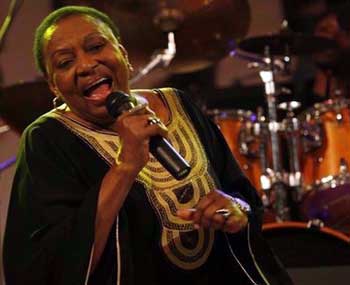‘Sing Loud Africa’
Ode to Miriam Makeba, beloved Mama Africa
By
Larry Hales
Published Dec 7, 2008 6:01 PM
“I picked up the soil from this unknown grave
and blew it up to the
wind as if
to make reference one day
and I said
mayibuye Africa
sing loud Africa
sing loud
sing to the people.”
–From “When You Come Back”
by Vusi Mahlasela
Vusi Mahlasela, a great singer who himself was banned from his homeland, wrote
this song for the many exiles and imprisoned South African freedom fighters and
artists.
Miriam Makeba, who died on Nov. 10, was one of the many. She was banned for 30
years, from 1960 to 1990. The name “Mama Africa” was bestowed upon
Makeba because she was the first person to make African music heard and known
internationally.
This is an ode to Miriam Makeba and her still resounding voice. Though her
physical form is gone forever, her visage will remain, not only in the hearts
and minds of those closest to her, but also in the minds of the millions who
have heard her voice, those who have yet to do so and the millions for whom she
sang.
Makeba was born in Johannesburg in 1939 and began singing professionally in the
early 1950s. She sang with a number of groups—such as the Cuban Brothers,
the Manhattans, the all-female Skylarks, and with Hugh Masekela in the musical
“King Kong,” about a boxer.
She was introduced to the international stage through Lionel Rogosin’s
film “Come Back Africa,” a dramatic documentary that displayed the
racist apartheid system.
Makeba’s passport was revoked while she traveled with this film and
presented it to an international audience.
In a Skylark song called “Miriam’s Goodbye to Africa,” a
speaker intones, “Today we say goodbye to Africa’s queen of soul,
Miriam Makeba. Good luck Miriam and please do come back to us soon.”
Makeba replies, “Goodbye mother/ goodbye father/ and to you my little
baby/ goodbye/ until we meet again/ farewell dear friends/ I am leaving/ may
the good lord be with you all/ though I’m leaving/ my heart remains with
you.”
The song, meant as a tribute, has become a haunting lament.
Neither Makeba nor the members of her group could know that she would be gone
for 30 years, that she would never again see her mother or be able to attend
her funeral, and never see Sophiatown as she remembered it, for it would be
bulldozed to the ground and replaced by a suburb for whites only.
Many events would pass which no one could foresee. But the conditions in South
Africa were dictated by a racist system that was formally instituted in 1948 by
then-Minister of Native Affairs Hendrik Frensch Verwoerd—who later became
prime minister and described apartheid as “a policy of good
neighborliness.”
Umkhonto we Sizwe was the armed wing of the African National Congress. Vuyisile
Mini, an Umkhonto activist and singer who was murdered by a hangman’s
noose, would write a song taunting Verwoerd titled, “Pasopa nansi
’ndondemnyama we Verwoerd” (Look out, Verwoerd, here are the Black
people). It would become a popular liberation song throughout the struggle to
free South Africa from apartheid and white rule. Makeba later recorded a
version of it.
Nelson Mandela said in his autobiography, alluding to himself, that a person is
known by her or his response to conditions. Miriam Makeba, then, is known as a
voice for freedom.
Each breath she took, like the terse exhalations in the song
“Amampondo”—about Mpondo warriors, part of the Xhosa-speaking
people, preparing for battle—was inspiration to the South African people,
as theirs were to her.
While Makeba could not be in her homeland, she could sing the words of struggle
for audiences who may not have otherwise been able to glean the conditions
imposed upon the masses of Black people in South Africa by a European
colonizer.
Sifiso Ntuli, an exiled activist, says in the film “Amandla”:
“Song can communicate to people who otherwise would not have understood
where we are coming from.”
Makeba’s voice was soaring and powerful and could evoke feelings of joy
and celebration, such as “Pata Pata,” and pride, anger or sorrow.
Whether she was singing in English or Xhosa, singing “Soweto
Blues,” about the massacre of students protesting classroom instruction
in Afrikaans, or “Khawuleza,” a song about what children shout to
their mothers when the authorities are coming, she could communicate the
conditions and the emotions of the oppressed.
Makeba would miss her mother’s funeral and those of her uncles killed in
the Sharpeville massacre in 1960. Her daughter died at eight years old, after
being reunited with Makeba and not able to return home. She would face scrutiny
and surveillance and exile in another land while married to Kwame Ture, yet her
resolve did not temper or wane.
Makeba continued to be a voice for the South African people and renowned
worldwide. Her spirit will exist in song and deed and her voice shall become a
voice for new generations and new struggles for a better world.
Long Live Mama Africa!
Hales saw and heard Miriam Makeba in Cuba in December 2006, when she
came out of retirement to perform in celebrations organized for the 80th birthday of Cuban President Fidel
Castro.
Articles copyright 1995-2012 Workers World.
Verbatim copying and distribution of this entire article is permitted in any medium without royalty provided this notice is preserved.
Workers World, 55 W. 17 St., NY, NY 10011
Email:
[email protected]
Subscribe
[email protected]
Support independent news
DONATE


